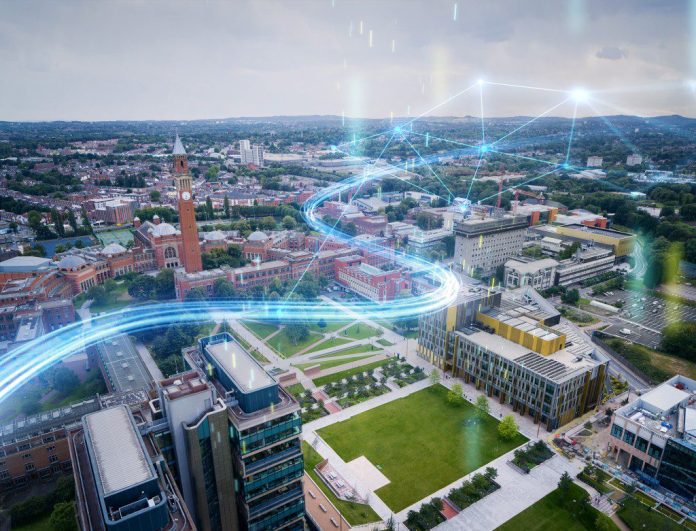The University of Birmingham in the UK has devised a plan to be “the world’s smartest global campus” by deploying IoT sensing and AI sense-making technologies to link academic research and teaching, and influence consumer habits, as part of a broader agenda around renewable energy generation and storage. It has recruited Siemens to implement the digital tech and energy solutions, starting with 23,000 IoT sensors, to be deployed in the autumn.
The German outfit will deliver a 10-year “bureau for energy and IoT services” to ensure the university “reaps the full potential of both the technology and industry expertise”. It will also sponsor and co-design a number of postgraduate PhD studentships to address challenges with data and technology in “urban systems” geared specifically towards achieving ‘net zero’ greenhouse energy emissions, as per the COP26 commitment to stop global warming by 2050.
The university envisions a ‘Living Lab’ for research, teaching, and learning into new digital tech and energy practices. It wants these academic disciplines to “benefit from access to new data and connectivity” in its twin connected campuses in Edgbaston in Birmingham and at a second international facility in Dubai (the University of Birmingham Dubai). The university’s campus in Dubai will be presented as a “global example of sustainability” at the rescheduled Dubai Expo 2020, running from October 2021 to March 2022.
A statement said: “The ‘Living Lab’ will capture data from the university’s building technologies, estates infrastructure, and energy plants and use it for innovation, R&D activities, as well as teaching. Scrutinizing energy demand and production – from systems to individual consumers/producers (prosumers) – with live data from across the sites provides a unique opportunity for applied learning for students and creates a platform for cutting-edge research.”
The University of Birmingham has reduced its carbon emissions by 20 percent in the past 12 months, it reckons. It has scheduled a further five-percent reduction, of 2,856 tons of CO2, it said. The university has recently signed up to the United Nations Global Compact, a non-binding UN pact by business leaders to adopt sustainable and socially responsible policies. It is a participant in the COP26 Universities Network.
Siemens suggested its new energy-focused IoT initiative, which starts in the autumn, will make it “the first university in the world to roll out IoT technology at scale”. The initial order of 23,000 IoT sensors, from Siemens’ Enlighted IoT division, are for smart buildings and smart lighting, and will be deployed across the Edgbaston estate. The University of Birmingham has 38,000 students, including 6,500 international students.
Matthias Rebellius, managing board member at Siemens and chief executive of its ‘smart infrastructure’ division, said: “As one of the largest universities in the UK, the university is already an energy prosumer. These technologies will be further optimized in the system we are now working on together. Partnerships like this are important for gathering new insights, developing new technologies, and creating efficient and sustainable infrastructure.”
Professor Tim Jones, provost and vice principal at the University of Birmingham, said: “Our goal is to deliver the campus of the future, using cutting-edge technologies to make our campuses in Edgbaston and Dubai the smartest globally. This will enhance our student experience, create new research and innovation opportunities, whilst significantly reducing our carbon footprint. As we approach COP26 in Glasgow this autumn, it is clear we are into the ‘decade of delivery’ for net zero targets.”

